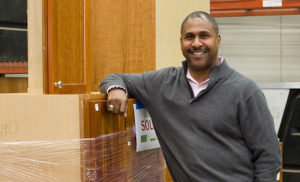 CEO and President Dr. Thomas Adams said, “Better Futures Minnesota is helping men repair and rebuild their lives. When you buy our reused materials or use our business services, you support the men we serve, the community, and Minnesota’s environment.” (Photo by Margie O’Loughlin)[/caption]
CEO and President Dr. Thomas Adams said, “Better Futures Minnesota is helping men repair and rebuild their lives. When you buy our reused materials or use our business services, you support the men we serve, the community, and Minnesota’s environment.” (Photo by Margie O’Loughlin)[/caption]
The Reuse Warehouse is keeping more than 650 tons of construction material out of landfills and incinerators annually, through their deconstruction services and sale of salvaged building materials. While providing this environmental benefit, they are also helping their employees repair and rebuild their lives from the ground up. Proceeds from sales at the Reuse Warehouse go to support Better Futures Minnesota, in which all of their employees are enrolled.
Better Futures Minnesota (BFM) President and CEO Dr. Thomas Adams explained, “Reuse Warehouse employees are African American men between the ages of 18-65. All of them have multiple felonies on their records, and would find it almost impossible to get jobs elsewhere. In terms of education, they have not received enough to be self-sufficient. All of this combines to create a dependency on jail, treatment facilities, homeless shelters, and government assistance.”
The men who come to BFM likely have a long history of unemployment, homelessness, and a disconnection from healthy support systems. Rebuilding lives can be a long, complicated process.
Adams said, “From experience, we know it takes a coordinated team working together to help our men start walking the path to a better life. BFM is not a job re-entry program. We are a response to a public health crisis.”
Integrated model works best
Better Futures Minnesota, which was founded in 2007, stands on these four fundamental principles:
Housing Stability: participants live at Great River Landing, a permanent, supportive housing model in the North Loop for 6-8 months. The men live in a dorm-style setting, and are able to establish rental history. They can eventually move into efficiency apartments at Great River Landing, or move on to other permanent living options in the community.
Health and Wellness: mental and physical health needs are addressed through partnerships with trauma-informed, culturally-specific care providers. Many of the men have previously undiagnosed and untreated health problems such as prostate cancer and diabetes.
Workforce Development: participants receive training in one of BFM’s six business lines. These are Deconstruction Services, Warehouse Sales, Appliance Recycling, Janitorial Services, Lawn/Snow Care, and Crew-Based Labor. Men receive up to 12 professional certifications before matriculating, giving them, in all likelihood, their first chance at being self-supporting.
Life Coaching and Compassionate Care: this is at the heart of BFM’s integrated care model that helps men start to rebuild their lives. Case management services are also available.
Adams explained, “The integrated care model we’re founded on is both a blessing and a curse. The blessing is that we’re able to see whole person transformation, and we frequently do.”
“The curse is that most of the world doesn’t operate this way. The Minnesota State Departments of Corrections, Human Services, Employment and Economic Development tell us we should be focusing on one thing for the sake of funding, but we know that focusing on one thing brings abysmal results.”
How is it that BFM landed in the green sector?
Adams said, “Our goal is to enter industries that are forgiving toward our men’s backgrounds. Jobs in deconstruction (which means taking structures apart, not just knocking them down) and recycling are forgiving, they pay a living wage, and they are right smack in the middle of the green sector.”
He continued, “Half of our business is on the green side. We go to environmental stewardship conferences all around the country, and we’re always the only organization of color. Climate change and renewable energy are not at the top of the list for most people of color – but job creation and health care are. We came to the environmental movement through these channels.”
Community members can support the work of Better Futures Minnesota by buying used building materials from their Reuse Warehouse, or hiring a service team from one of their six business lines. BFM currently has property maintenance contracts with more than 300 residential and commercial properties around the Twin Cities.
The Reuse Warehouse is located near the “Minnehaha Mile,” a shopping corridor dedicated to recycled, reused, and reclaimed products. Their address is 2620 Minnehaha Ave. Donations of building materials and household goods are also welcome.
Visit www.betterfuturesminnesota.com to learn more.
success story
John is a 49 year old man who’s been in and out of jail for the past 15 years due to poor decisions, alcohol abuse, and homelessness. He missed 12 of his daughter’s 17 birthdays while he was behind bars. John chose to enroll in Better Futures Minnesota because, in his words, “the name said it all.” In the last 14 months, John has remained sober, received all of the certifications BFM has to offer, obtained permanent housing, and had his daughter stay with him every other weekend. Last winter, he took a trip to the Florida beach for the first time in his life. John has a new lease on life and has recently started his own cleaning company, thanks in part to the certifications and skills he obtained from BFM.
~ Courtesy of BFM
Comments
No comments on this item Please log in to comment by clicking here